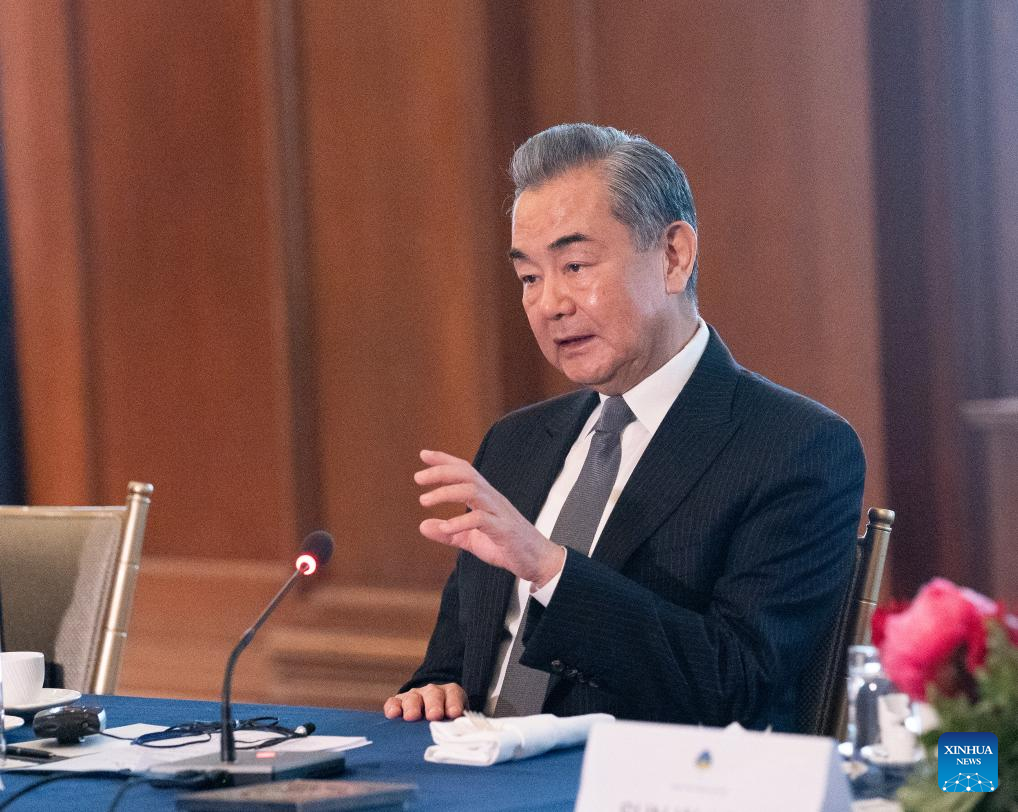
Wang Yi, a member of the Political Bureau of the Communist Party of China Central Committee and Chinese foreign minister, holds discussions with U.S. strategists in Washington, D.C., the United States, Oct. 28, 2023. (Xinhua/Liu Jie)
WASHINGTON, Oct. 28 (Xinhua) -- Wang Yi, a member of the Political Bureau of the Communist Party of China Central Committee and Chinese foreign minister, held discussions with U.S. strategists here on Saturday.
Wang said that during his visit, China and the United States with an attitude of equality and mutual respect had in-depth, constructive and substantive strategic communication on many issues of common concern, and jointly sent a positive signal about stabilizing and improving China-U.S. relations.
Despite various differences and disputes between the two countries, with many issues yet to be resolved, both sides believe that it is beneficial and necessary for them to maintain dialogue as two major countries.
He said both sides hope to stabilize and improve bilateral relations as soon as possible and agreed to work together toward a San Francisco summit between the two heads of state.
Meanwhile, the path to San Francisco is not smooth and cannot be left to "autopilot," said the Chinese foreign minister.
To this end, the two sides should earnestly return to what was agreed at the Bali summit, truly implement the consensus of the two heads of state, eliminate interference, overcome obstacles, enhance consensus and accumulate results, Wang said.
Wang appreciated the participants' involvement in and commitment to the development of China-U.S. relations.
He invited them to visit China more often and encouraged them to continue to make rational voices so as to play a constructive role in helping the American society develop objective views of China, correctly treat and handle the differences and disputes between the two countries, and contribute more wisdom to the healthy, stable and sustainable development of China-U.S. relations.
The participants indicated that a stable U.S.-China relationship is in the interests of both sides.
U.S.-China cooperation has played and will be playing a crucial role in solving international and regional hot-spot issues, they said.
The U.S. strategic community does not agree with the idea that U.S.-China engagement has failed and supports the two sides in resuming dialogue in various fields, promoting cooperation in economy, trade, science and technology, facilitating personnel exchanges so that misunderstanding and misjudgment can be avoided through deepening communication and enhancing understanding.
The participants said that in the face of geopolitical conflicts and global disorder, it is necessary for the United States and China to strengthen communication and jointly tackle global challenges.
Wang also had in-depth exchanges with the participants on issues of concern, such as China-U.S. military exchanges, bilateral cooperation in finance, science and technology and people-to-people exchanges, China's investment environment and market access, the situation in the Middle East as well as the Ukraine crisis.
The event was hosted by the Aspen Strategy Group. ■



